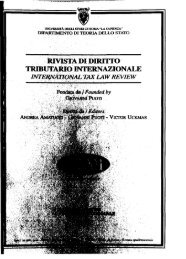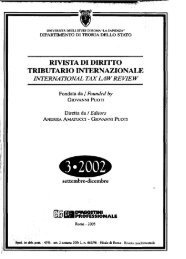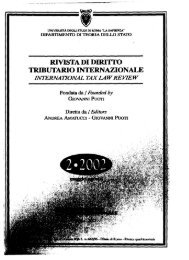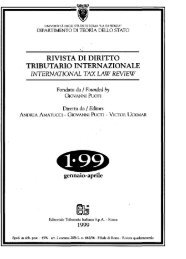RIVISTA DI DIRITTO TRIBUTARIO INTERNAZIONALE - Rdti.it
RIVISTA DI DIRITTO TRIBUTARIO INTERNAZIONALE - Rdti.it
RIVISTA DI DIRITTO TRIBUTARIO INTERNAZIONALE - Rdti.it
You also want an ePaper? Increase the reach of your titles
YUMPU automatically turns print PDFs into web optimized ePapers that Google loves.
A. S. Bergantino: Tonnage tax: the Italian proposal and the European experiences<br />
on the national register. even when such registration is not set down as<br />
qualifying cond<strong>it</strong>ion.<br />
c) The traffie adm<strong>it</strong>ted<br />
In generaI. in the various European countries, no express distinction<br />
is made, for the purposes of adm<strong>it</strong>ting a vessel to the regime, between<br />
ships used in coastal navigation and ships used in intemational traffico<br />
This lack of provision is to be put down to the fact that in some cases <strong>it</strong><br />
would be extremely difficult to make such a distinction. However, the absence<br />
of any distinction allows operators who are "sheltered" from compet<strong>it</strong>ion<br />
by operators of third countries - in that the latter cannot freely<br />
access Commun<strong>it</strong>y coastal navigation trades -, to be adm<strong>it</strong>ted to the<br />
lump-sum regime. If the objective of the measure is for the national fleet<br />
to achieve a compet<strong>it</strong>ive edge over third countries' fleets, ships operating<br />
in cabotage traffic should not be adm<strong>it</strong>ted to the lump-sum regime. Ho\Vever,<br />
<strong>it</strong> should be a decision taken at Commun<strong>it</strong>y leve!.<br />
Since most of Europe has failed to exclude from tonnage tax ships<br />
used in coastal navigation, a similar decision on the part of Italy<br />
would be greatly damaging on account of the almost compi et ed liberalization<br />
for EU operators of coastal navigation among member<br />
countries.<br />
It might be appropriate then, to distinguish between European and<br />
national coastal navigation traffic (over medium to long distances), exposed<br />
to the compet<strong>it</strong>ion of other European countries, and 'Iocal' traffic<br />
(links w<strong>it</strong>h minor islands), which in this respect, is for the most part stili<br />
protected (27). The inherent difficulties in differentiating between ships<br />
used in the t\Vo types of traffic could in part be solved by referring to a<br />
size lim<strong>it</strong>o<br />
d) Lim<strong>it</strong>s based on eompanies' legai form<br />
The Un<strong>it</strong>ed Kingdom, pursuing the twofold objective of establishing<br />
a stringent ring fencing and of attracting a greater number of vessels,<br />
introduced the obligation of 'group acces": ali the companies belonging<br />
to the same group are to opt for the regime, ali in ali aut. The latter,<br />
however, is the most controversial aspect of the Br<strong>it</strong>ish legislation<br />
and the mai n obstacle in the way of the measure achieving greater su c-<br />
(27) A differentiated system is in force in Greece. The lump-sum taxation regime<br />
applies also to ships that only calI at national ports; the tax to be paid by these ships,<br />
however, is obtained through the use of different coefficients and the final ouday is<br />
calculated in the Iocal currency (whereas ordinary tonnage tax is calculated in dol<br />
Iars), see footnote 28.<br />
<strong>RIVISTA</strong> <strong>DI</strong> <strong>DI</strong>RmO TRIBL"TARlO <strong>INTERNAZIONALE</strong> 312001






